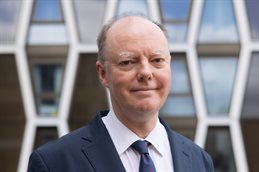The role of the state in in preventing disease by Professor Chris Whitty
This year’s Research Day Thomas Young Lecture will be delivered by Professor Chris Whitty, Chief Medical Officer for England, the UK government’s Chief Medical Adviser.
The lecture will take place from 4.30pm to 5.30pm on Wednesday 11 December 2024 in the Michael Heron Lecture Theatre (Hunter Wing, Level 1).
Due to the popularity of the Thomas Young Lecture, spaces in the Michael Heron Lecture Theatre will be on a first come first served basis and overflow area will be created in The Curve Lecture Theatre (Hunter Wing, Level 0).
Registration for this years Thomas Young lecture has now closed.
About the speaker
 Professor Chris Whitty is the Chief Medical Officer (CMO) for England, the UK government’s Chief Medical Adviser, and head of the public health profession.
Professor Chris Whitty is the Chief Medical Officer (CMO) for England, the UK government’s Chief Medical Adviser, and head of the public health profession.
He is a practising NHS Consultant Physician at University College London Hospitals and the Hospital for Tropical Diseases, and undertook clinical training at the School of Health & Medical Sciences as well as Africa, Asia and elsewhere in the UK. Before his role as CMO he was Chief Scientific Adviser (CSA) at the Department of Health and Social Care, head (CEO) of NIHR, CSA at the Department for International Development and interim Government Chief Scientific Adviser.
He was Professor of Public and International Health at the London School of Hygiene and Tropical Medicine (LSHTM), undertaking research in Africa and Asia where he continues as an honorary professor.
About the Thomas Young Lecture
Thomas Young (1773-1829) was a Fellow of the Royal Society and a polymath who worked on subjects as diverse as optics, mechanics and physiology as well as deciphering the Rosetta Stone.
In years past, speakers have included Peter Piot, Keith Peters, David Weatherall, Douglas Black, Margaret Turner-Warwick, David Nabarro, Ann Johnson, Professor Sir Mark Caulfield and Sir Paul Nurse.
The intention is for the lecture to appeal to a broad audience of mainly researchers but also students at all levels, professional staff and Council so the best mix is some basic science with some more general concepts around genomics/research more broadly.